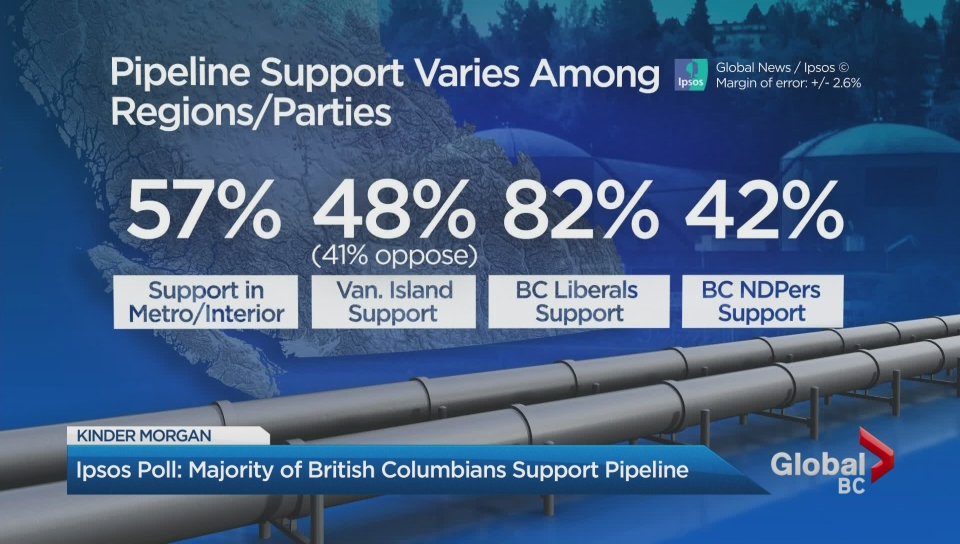As Trans Mountain decision looms, poll suggests majority of B.C. still supports pipeline
With the federal government set to decide whether to give the Trans Mountain pipeline expansion the green light again, B.C. is preparing for another round of fighting over the controversial project.
But a new poll released Monday suggests a majority of the province is in favour of the controversial project and wants to see it approved.
The poll, conducted last week by Ipsos on behalf of pro-development advocacy group Resource Works, found 60 per cent of those surveyed support the expansion while only 29 per cent oppose it.
Ipsos senior vice-president Kyle Reid said while much of the rhetoric coming from B.C. may prove otherwise, this latest poll doesn’t actually show anything new.
“Our polling, both for governments and industry along with other polls along the past couple of years, have all shown the same thing,” he said. “Ever since the Trudeau government put its stamp of approval on this project, support has moved above majority level and hasn’t moved since that time.”
While Reid recognizes the poll reflects some British Columbians’ “serious concerns” about the expansion, he said it sends a clear message that most other residents simply want to move on from the debate.
The poll, which surveyed 803 British Columbian adults between June 10 and 14, found support was in the majority in all regions of the province, including Metro Vancouver at 59 per cent, Vancouver Island at 60 per cent, and the Interior and northern B.C. at 63 per cent.
Support was highest among older residents surveyed, with 67 per cent of respondents 55 years old and above approving the project. But a slim majority of younger residents between 18 and 34 years old were also positive about the expansion at 52 per cent.
The project would twin the existing Trans Mountain pipeline that runs from northern Alberta to Burnaby, potentially tripling the amount of bitumen flowing between the provinces.
The federal cabinet is set to announce by Tuesday whether it will approve expansion for a second time, after the Federal Court of Appeal ruled last year that the first round of consultations with Indigenous groups was not done properly ahead of Ottawa’s first approval in 2016.
The Trudeau government purchased the $7.4 billion pipeline directly from Kinder Morgan in 2017 after the company voiced unease over continued protests and blockades at its tanker facility on Burnaby Mountain.
Resource Works executive director Stewart Muir said in a statement the poll is further proof that most people recognize the importance of the pipeline expansion to the Canadian economy and energy sector.
“It is plain to a significant majority that this is a beneficial project,” Muir said. “British Columbians can see through the politics and rhetoric to understand we rely on Alberta oil and gas to fuel our vehicles, homes, and workplaces, and that this pipeline is desperately needed to ensure a steady supply.”
Muir noted the poll reflects a similar survey conducted in April 2018 that found 55 per cent of Canadians overall support the pipeline.
Speaking to reporters Monday, Premier John Horgan said he saw the poll but that it won’t influence his actions going forward.
“I am influenced by a range of inputs, mostly by people rather than polls,” he said.
“I talk to people hear that live on the Strait of Juan de Fuca, they happen to be my constituents, and they had a decidedly different view from Ipsos. But I am not oblivious to that. I know this has been a challenging issue from the start.”
The premier added he’s committed to taking the province’s case over its rights to control the flow of bitumen from Alberta to the Supreme Court of Canada, despite the B.C. Court of Appeal unanimously shutting it down last month.
In a statement, B.C. Green Party Leader Andrew Weaver noted former federal environment minister David Anderson’s letter to cabinet that said he found “no business case” for the expansion, while urging Ottawa to speed up the transition from fossil fuels in the face of growing climate change.
“Building a new pipeline for diluted bitumen with a lifespan of 40-50 years is utterly incompatible with our responsibility as elected leaders to respond to the biggest crisis we face,” Weaver said.
“We can make the changes demanded of us and create widespread prosperity as we do so. Canada’s global reputation, and the future we leave for our children, are on the line.”
— With files from Richard Zussman and the Canadian Press
The poll was conducted by Ipsos on behalf of the Resource Works between June 10 and 14, 2019. For this survey, a sample of 803 adult British Columbians (18+ years) was interviewed online via the Ipsos I-Say panel and non-panel sources. These data have been weighted by region, gender, age and education to reflect the population of BC according to Census figures. The precision of Ipsos polls conducted online is measured using a credibility interval. In this case, the overall results are accurate to within ±4.0 percentage points, 19 times out of 20, had all adult British Columbians been polled. The credibility interval will be wider among subsets of the population. All sample surveys and polls may be subject to other sources of error, including, but not limited to coverage error, and measurement error.
Source: Read Full Article





